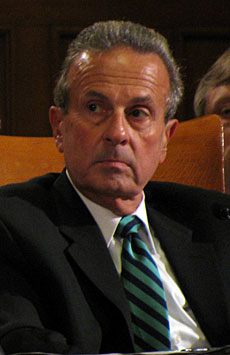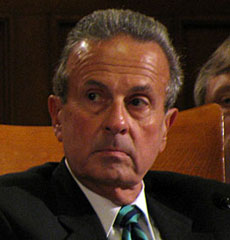City manager promises the fearful: No retaliation for discrimination complaints

City Manager Richard C. Rossi assured residents Tuesday that “I would never, ever take retaliation against somebody” for a discrimination complaint.
Despite there being a new boss in the executive suite, city employees with stories to tell about racial or sexual discrimination were afraid to testify Tuesday at a Civic Unity Committee meeting, other workers said. That prompted Richard C. Rossi – city manager since July 1, but deputy city manager since 1981 – to make a promise for those who did speak:
“I would never, ever take retaliation against somebody because they came to me and wanted to talk about something they felt uncomfortable with in the city,” Rossi said.
Another inspiration for his vow was the story of Nancy M. Ryan, who retired in 2006 from the Cambridge Women’s Commission after a quarter-century – in part, she said, because of a “shunning” in City Hall after she testified in another woman’s discrimination and retaliation lawsuit against the city.
The meeting is the fourth run by city councillor Denise Simmons about “lessons learned” from that case, in which former city employee Malvina Monteiro and other women filed suit against the city in 1998. Malvina was ultimately awarded millions in 2011 when a jury finding was upheld twice by higher courts.
But she was just one of six such lawsuits lost or settled for as much as $16 million in the past couple of years, and a new crop of seven suits faces the city now. Freedom of Information requests by the Cambridge Chronicle and independent journalist and MIT student John Hawkinson have shown that at least one case is ready for trial, and that the new cases revolve around a city accountant and several parking control officers who say they were treated more harshly than other employees when it came to such things as job performance and time off.
Changes from the top
Rossi has promised to change the tenor of treatment and ensure complaints are addressed quickly and fairly, and his update Tuesday included a list of actions he has taken, such as meeting with department heads and handing out not just copies of Simmons’ meeting minutes as mandatory reading, but 15 copies of the book “Blindspot: Hidden Biases of Good People,” by Harvard’s Mahzarin R. Banaji. He said he has also met with a consultant and outside groups with the goal of bringing an outsider’s perspective to Cambridge, potentially in a permanent ombudsperson position, to ensure complaints get an objective hearing.
He said he is following up daily with department heads and others on resolving current grievances.
Ken Reeves, who attended the meeting with fellow councillors Simmons, Craig Kelley and Minka vanBeuzekom, said he wanted to see more diversity at the top of City Hall organizational charts and in the police and fire departments.
Iram Farooq, a woman of Indian descent, was named acting deputy director for the Community Development Department last month after serving as a senior project manager since 1999, and it’s reported that the city’s information technology department has been working with consultant Anne Litwin, a specialist in diversity issues.
Notably, attorney Richard Clarey, who has been a fierce critic of the city and its losing approach to the lawsuits, said “I’m hopeful there will be improvement, because although I’ve spent many hours reading all the papers in this case, I’ve never seen Mr. Rossi’s name involved in any wrongdoing at all. Nearly everyone else is named in one case or another. Mr. Rossi is in an excellent position to turn a new page.”
Ryan agreed.
“I have confidence in the new city manager that he is taking these things seriously,” she said.
Retaliation
Still, she wanted to tell her story in solidarity with other city employees, she said, and recounted how, as executive director of the Women’s Commission, she was called to court to testify in the original discrimination and retaliation cases against the city. “The prior city manager stopped attending my budget hearings and stopped speaking to me or acknowledging my presence in City Hall or anywhere else, and a number of other senior administrators in the city did the same. It was pretty distressing,” she said. “The shunning was personally painful and kind of infuriating – and it sent a message to other city workers.”
“I retired in 2006 in part because I couldn’t do my job,” she said. “I couldn’t get my boss to pay serious attention to my work.”
Despite the retirement of Robert W. Healy this summer and promotion of Rossi, two women testified Tuesday to having co-workers who are people of color who feared exactly that kind of response to speaking up. “They do not come forward for fear they will be retaliated against,” said Patricia Lewis, who told at length the story of a black, female co-worker – recently named an employee of the year – who went from office to office in Cambridge as she’d been advised looking for help and mediation with a white supervisor who was being racially offensive. Frustrated within the city, she filed complaints with the Massachusetts Commission Against Discrimination and federal Equal Employment Opportunity Commission.
“This is a perfect example,” Lewis said. “She went through all agencies asking for help, asking for mediation, and never, ever receiving it. She had no choice but to go to MCAD and EEOC.”
Fellow employee Sylvia Barnes pointed out what she saw as two systemic flaws in how Cambridge handled discrimination complaints: calling them “disagreements”; and having the city’s Law Department defend the accused. The resulting culture has been in place for more than three decades, “and it is difficult to change it with the same people in place,” Barnes said, reminding Rossi that he’d been second-in-command in the city for the entire time, feeding skepticism that things would change under his watch.
“Several employees would have been present as well, but they have told me they were fearful of retaliation if their managers knew they attended this meeting,” Barnes said.
“A time bomb”
Councillors had criticisms for the council’s inaction during the lawsuits, and they showed flashes of skepticism toward the administration as well, with Reeves saying he’d seen no evidence of any manager ever being punished for discrimination and vanBeuzekom wondering why she kept hearing of workers being denied mediation through the city’s Office of Affirmative Action. Officials refuted both, with Affirmative Action director Duane Brown saying there has been mediation – in fact, he is a trained mediator – but that it’s not an answer for every situation.
Rossi said that while he wouldn’t talk about individual cases, managers have been punished for insensitivity on race and sex. He also debunked another concern, assuring that Nancy Schlacter, executive director of the Cambridge Human Rights Commission, had never been general counsel to the former city manager; she had assisted in Rossi’s office and, although an attorney, not by practicing law.
“I’m impressed with where we’re going,” Kelly said toward the end of the meeting. “Time will tell.”
Attorney Clarey, though, warned that in some ways the city had very little time to act.
The Monteiro case had been such a disaster for the city, he said, that it would be best to keep the current round of lawsuits out of a courtroom so a judge or jury didn’t get the chance to see a new case as a continuation of old city policies.
‘The Monteiro case is a time bomb,” Clarey said. “If a plaintiff’s lawyer gets before a jury he’s going to yell ‘Monteiro’ all the way through that case.”

